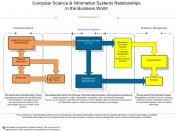In the recent past several years many organizations have initiated Enterprise Systems (ES) projects, leads to a major paradigm shift. The adoption requires the examination of the factors that precipitate a search for systems that will provide a solution to the current information systems, structured around previous thinking as motivation for investment in information systems for business. The process considers the attributes applicable to the decision for adopting ES once it has emerged as a contender to acquire. The failure to do this successfully can be extremely costly as demonstrated by an array of failure cases reported. The paper outlines the significance of ES and analyses the adoption related issues. The study provides a framework for the selection process of ES which can be useful in identifying critical factors for further research and supporting managers considering ES projects.
INTRODUCTIONs the pace of change accelerates in the twenty-first century as a result of technological opportunities, liberalization of world markets, demands for innovation, and continually decreasing life cycles, organizations are finding that they have to continuously re-adjust and re-align their operations to meet all these challenges.
This pace of change has increasingly forced organizations to be more outward looking, market-oriented, and knowledge driven. A useful tool that businesses are turning to, in order to build strong capabilities, improve performance, undertake better decision-making, and achieve a competitive advantage is Enterprise Systems (ES) software. (Al-Mudimigh A., et al., 2001) THowever, it has been estimated that about half of ES implementations fail to meet expectations (Appleton, 1997). Other reported figures show that more than 70 percent of ES implementation fails to achieve their estimated benefits. According to a survey (Themistocleous et al. 2001), organizations adopting ES certainly acquire benefits such as an increase suppliers' and customers' satisfaction and an increase in productivity but the level...


